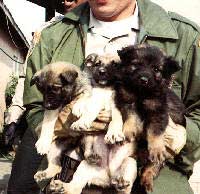 Based on pet theft reports filed with Action 81, Inc., In Defense of Animals, and others, it is conservatively estimated that approximately 1.5 to 2 million of these missing family pets are taken forcibly, or by deception, through so-called “Free to Good Home” ads. Dogs and cats are sold to many different clients for many uses, including dog-fighting rings as fighters or as bait, to “puppy-mills” for breeding, as meat for human consumption, as prey for exotic animals, as fur for clothing or accessories, as protective guard dogs, or for cult rituals.
Based on pet theft reports filed with Action 81, Inc., In Defense of Animals, and others, it is conservatively estimated that approximately 1.5 to 2 million of these missing family pets are taken forcibly, or by deception, through so-called “Free to Good Home” ads. Dogs and cats are sold to many different clients for many uses, including dog-fighting rings as fighters or as bait, to “puppy-mills” for breeding, as meat for human consumption, as prey for exotic animals, as fur for clothing or accessories, as protective guard dogs, or for cult rituals.
However, the most consistent and highest-paying client is often the research industry. Hundreds of thousands of cats and dogs are used as laboratory subjects in universities and testing and research institutions every year. Research institutions prefer to experiment on animals that are accustomed to humans, as they tend to be docile and much easier to handle
The Sale of Pound, Shelter and Humane Society Animals
Some pounds, shelters and humane societies may sell “surplus” dogs and cats to Class B dealers and/or research facilities–a practice commonly called “pound seizure.” To date, only 13 states have outlawed pound seizure. They are: Connecticut, Delaware, Hawaii, Maine, Maryland, Massachusetts, New Hampshire, New Jersey, New York, Pennsylvania, Rhode Island, Vermont and West Virginia. In those states where pound seizure has not been banned, it is up to each city or county (depending on whether a facility is city or county run) to decide whether or not to allow or mandate Pound Seizure.
Whether or not a state-wide ban on Pound Seizure exists, some pounds or shelters practice pound seizure illegally–some even acquiring pets illegally. There are known cases of family dogs and cats being picked up as “strays,” being “laundered” through the pound, shelter or humane society system (by withholding them from view or taking them to an out-of-town facility to fulfill the required five-day holding period), and later sold to a dealer or research facility. Having a pound, shelter or humane society that practices pound seizure in your area means that every pet is worth money, and increases the chances of pet theft occurring in your community.
Animal Dealers and the USDA
The United States Department of Agriculture (USDA) has a division called Animal, Plant Health Inspection Service (APHIS) which is responsible for licensing and regulating animal dealers, animal exhibitors, intermediate handlers, and research facilities (which utilize animals) according to the regulations of the federal Animal Welfare Act (AWA). The AWA is a set of laws which establish guidelines for the care and use of animals by animal dealers, research facilities, intermediate handlers, and exhibitors.
A subdivision of APHIS, called Regulatory Enforcement and Animal Care (REAC) is responsible for enforcing the AWA regulations by inspecting covered facilities, conducting investigations, imposing and collecting fines, and suspending/revoking the licenses/registrations of dealers and research facilities who are in violation of the AWA regulations.
In the case of animal dealers, these violations can include: failure to provide sufficient food, shelter and water for the animals, insufficient veterinary care, insufficient sanitation, overcrowding, not fulfilling the stipulated holding period, or inaccurate or incomplete recordkeeping. The recordkeeping regulations are particularly important, because maintaining accurate records of where an animal came from (acquisition) and to whom an animal was sold or traded (disposition) are the only ways trace an animal who may be a missing or stolen pet.
There are two types of animal dealers licensed by the USDA
1. Class A (or purpose-bred) dealers who breed and raise (mostly pure-bred) animals on their property. They commonly sell animals to pet stores, research institutions, and other Class A and Class B dealers.
2. Class B (or random-source) dealers who obtain a variety of (often mixed breed) dogs and/or cats from pounds, shelters, animal auctions or trade and sale days, and other Class A and B dealers. Class B dealers typically sell animals to research institutions, other Class B dealers, and for food and fur.
Last chance for Animals
Last chance for Animals is a national, non-profit organization dedicated to eliminating animal exploitation through education, investigations, legislation, and media attention. The organization believes that animals are highly sentient creatures who exist for their own reasons independent of their service to humans; they should thus not be made to suffer for the latter. LCA therefore opposes the use of animals in food and clothing production, scientific experimentation, and entertainment. Instead it promotes a cruelty-free lifestyle and the ascription of rights to non-human beings. http://www.lcanimal.org
